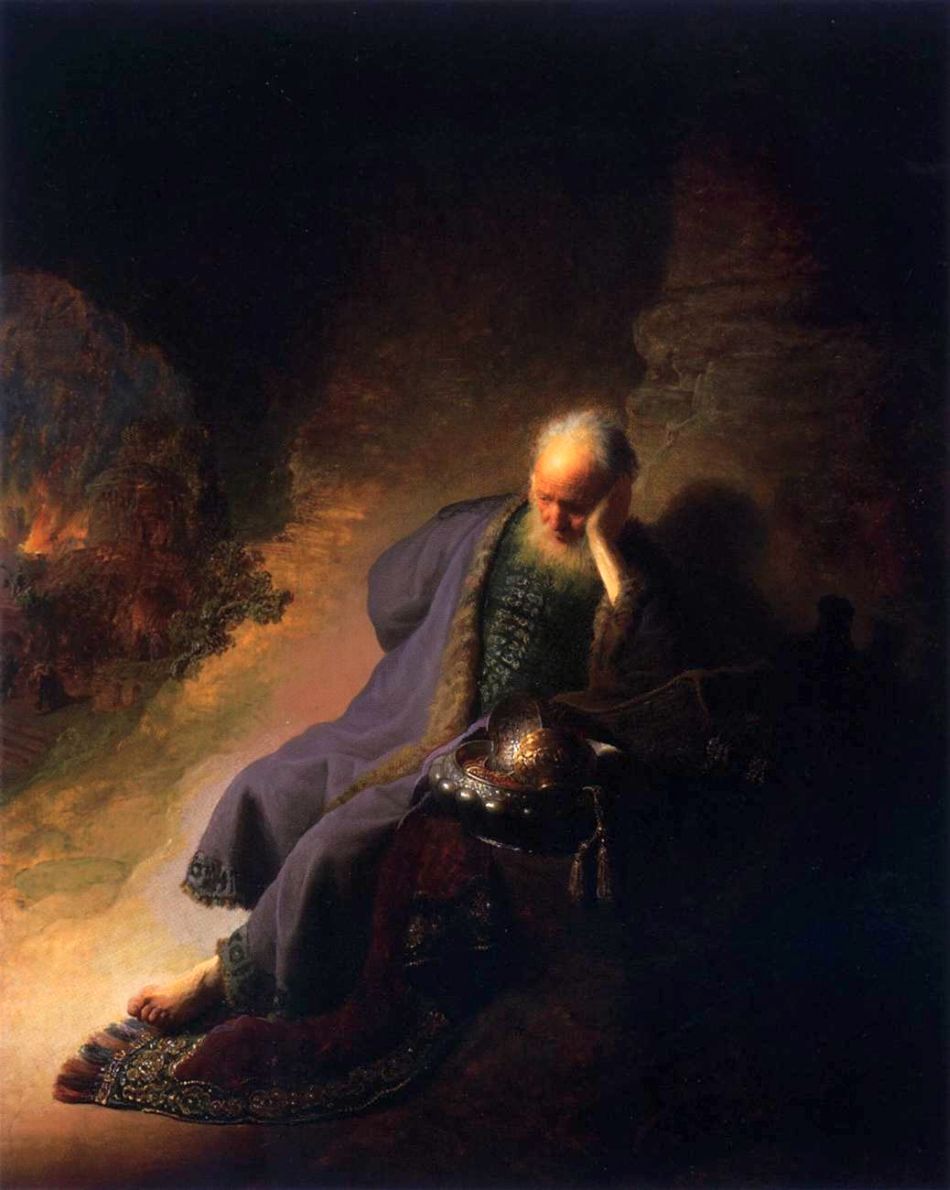|
DAWN
Daily Arts Web Nucleus
Discover the Arts! Each day a different image from the Literary, Performing, or Visual Arts representing a portion of Scripture plus an explanation with links and a discussion forum 2013 October 10
Jeremiah Lamenting the Destruction of Jerusalem (1630) Rembrandt Harmenszoon van Rijn (1606-1669) Dutch Golden Age Baroque Style Rijksmuseum, Amsterdam, Netherlands Image Source: Web Gallery of Art
Lamentations 4 Aleph 1 How is the gold become dim! how is the most fine gold changed! the stones of the sanctuary are poured out in the top of every street. Beth 2 The precious sons of Zion, comparable to fine gold, how are they esteemed as earthen pitchers, the work of the hands of the potter! Gimel 3 Even the sea monsters draw out the breast, they give suck to their young ones: the daughter of my people is become cruel, like the ostriches in the wilderness. Daleth 4 The tongue of the sucking child cleaveth to the roof of his mouth for thirst: the young children ask bread, and no man breaketh it unto them. He 5 They that did feed delicately are desolate in the streets: they that were brought up in scarlet embrace dunghills. Waw 6 For the punishment of the iniquity of the daughter of my people is greater than the punishment of the sin of Sodom, that was overthrown as in a moment, and no hands stayed on her. Zayin 7 Her Nazarites were purer than snow, they were whiter than milk, they were more ruddy in body than rubies, their polishing was of sapphire: Heth 8 Their visage is blacker than a coal; they are not known in the streets: their skin cleaveth to their bones; it is withered, it is become like a stick. Teth 9 They that be slain with the sword are better than they that be slain with hunger: for these pine away, stricken through for want of the fruits of the field. Yodh 10 The hands of the pitiful women have sodden their own children: they were their meat in the destruction of the daughter of my people. Kaph 11 The LORD hath accomplished his fury; he hath poured out his fierce anger, and hath kindled a fire in Zion, and it hath devoured the foundations thereof. Lamed 12 The kings of the earth, and all the inhabitants of the world, would not have believed that the adversary and the enemy should have entered into the gates of Jerusalem. Mem 13 For the sins of her prophets, and the iniquities of her priests, that have shed the blood of the just in the midst of her, Nun 14 They have wandered as blind men in the streets, they have polluted themselves with blood, so that men could not touch their garments. Samech 15 They cried unto them, Depart ye; it is unclean; depart, depart, touch not: when they fled away and wandered, they said among the heathen, They shall no more sojourn there. Pe 16 The anger of the LORD hath divided them; he will no more regard them: they respected not the persons of the priests, they favoured not the elders. Ayin 17 As for us, our eyes as yet failed for our vain help: in our watching we have watched for a nation that could not save us. Sadhe 18 They hunt our steps, that we cannot go in our streets: our end is near, our days are fulfilled; for our end is come. Qoph 19 Our persecutors are swifter than the eagles of the heaven: they pursued us upon the mountains, they laid wait for us in the wilderness. Resh 20 The breath of our nostrils, the anointed of the LORD, was taken in their pits, of whom we said, Under his shadow we shall live among the heathen. Shin 21 Rejoice and be glad, O daughter of Edom, that dwellest in the land of Uz; the cup also shall pass through unto thee: thou shalt be drunken, and shalt make thyself naked. Tau 22 The punishment of thine iniquity is accomplished, O daughter of Zion; he will no more carry thee away into captivity: he will visit thine iniquity, O daughter of Edom; he will discover thy sins.
Tomorrow's Picture: TBA
AD LIB ARTS EMAIL copyright 2013, Scott Souza |
